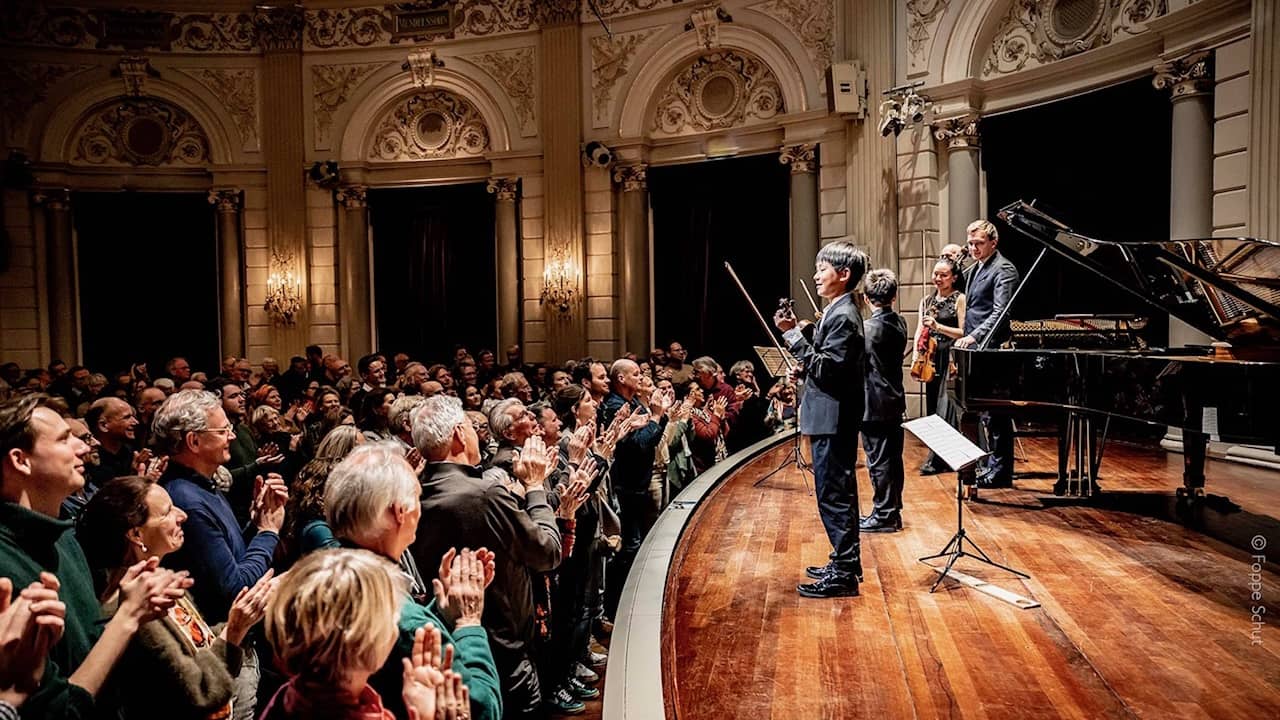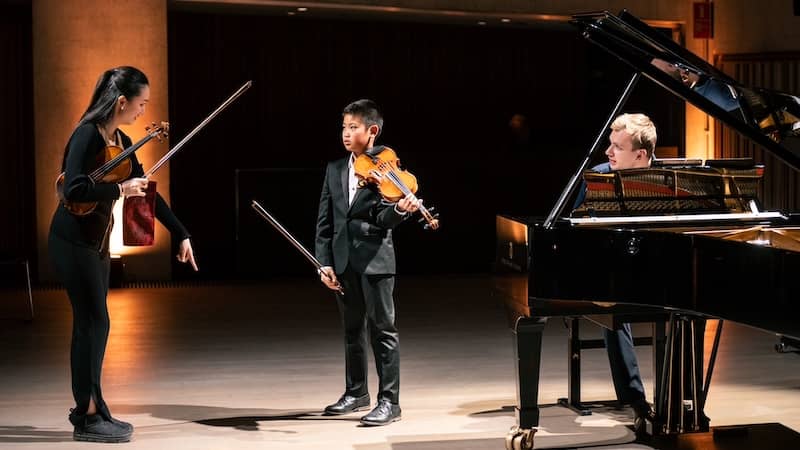We have thousands of human-written stories, discussions, interviews and reviews from today through the past 20+ years. Find them here:
'Experience Klassiek Academy': Real-World Touring Experience for Young Musicians
With so much muttering about the irrelevance of classical music to young lives, a story in which young violinists are given the golden opportunity to experience on-the-road concert life is much welcomed.
The brainchild of the acclaimed violinist Karen Su, a laureate of the last edition of the prestigious Queen Elisabeth International Competition, and her musical partner, pianist Ruben Plazier, Experience Klassiek Academy combines the intensity of performance with the reality of life as a touring musician in Europe. The young participants in the program have performed in great halls across Europe, including the Concertgebouw, Rudolfinium Prague and throughout Belgium.
As Plazier explained, "what is most important is the young performers’ experiences in smaller halls, and beyond the experiences in these venues, it is their encounters with what an artist’s life is really like that adds an extra dimension to our program."
In most programs for young soloists, "the untold hours of on-and-off the road and the real daily life challenges are missing from that equation," he said. Their aim with the program is threefold: to give students performance practice, to introduce them to rigors of touring, and to give them the opportunity to interact with audiences. "Every academy participant is encouraged to speak with their public, not only through music, but during planned social get-togethers," Plazier said.

Young participants in "Experience Klassiek Academy" perform in a European concert. Photo by Foppe Schut.
The idea for the Academy started several years ago when Su and Plazier were coaching several gifted students in Karen’s father's studio. (Her father is the LA-based violin pedagogue Elmer Su.) "Yes, these youngsters played extremely well and were prepared to win prizes at competitions. But we asked ourselves: Did they know what they were getting into in the performing arts world, after winning those prizes?" Plazier said. "It is as if you choose the career path - winning before you even realize what a career is like. Our idea was, why not join us on tour? Play a pre-concert, travel with us, eat with us, experience the dressing room stress, learn to relax somehow and find out what happens the day after the concert."
The two artists came up with a multifaceted plan to bring several carefully selected U.S. teens to Europe in order to delve into the source of their musical art in more ways than one. Part of exposing young American musicians to Europe is the obvious appeal of experiencing old culture.
"We tell our youngsters, ‘You are now playing in Haarlem, these building are much older than anything you might have seen in LA.... and take a closer look at that church, Mozart performed there!’" he said.
Both founders were indelibly shaped by their European training: early on, Su left the comforts of home life in the States to study with Vesna and Igor Gruppman in Rotterdam, Netherlands and the Dutch-born Plazier set forth for the Ecole Normale de Musique Alfred Cortot in Paris, France, working intensively with Jean-Bernard Pommier.
Plazier’s immersive musical education, thanks to piano master Jean-Bernard Pommier, exerted influence far beyond performance. A pianistic father-figure, Pommier passed on traditions passed down from generations of great pedagogues. Plazier was privileged to join a small elite class of students, spending three intensive days per week were at lessons, coaching sessions and importantly, at breakfast, dinner and late-evening talks that covered the widest gamut of subjects.
"The culture of the art we engage in was transmitted in this intense all-round manner," Plazier said. "To benefit, students had to be open to Pommier’s focus, criticism and intensity. If you could not handle starting over, you were not ready to go on the long voyage."
One of the unexpected lessons learnt by the young participants at the Academy involves a deeper understanding of collaborative performance. "When we focus on competitions as upcoming soloists, we often forget that our core repertoire brings us to the world of chamber music," Plazier said. "Students are used to playing with 'accompanists,' not pianists -- a pianist is not there to serve your virtuosity, but as an equal partner." To that aim, the Academy offers the chance to perform sonatas with Plazier coaching and working in partnership at concerts, truly a consciousness-raising encounter.

Karen Su and Ruben Plazier work with Academy participant Lucas Tzeng. Other recent young participants (not pictured) include Jacob Sun & Luke Li. Photo by Foppe Schut.
Another unexpected learning moment occurs when performing artists are confronted by challenges of the road: out-of-tune pianos, missing chairs onstage, and last but not least: touring intensity. "Not every performance takes place in a great hall, sometimes the day after a major venue you mount the stage in a small provincial hall with 100 people in the audience. And, you have travelled a long way to get there," Plazier said.
To add dimension to the students’ toolbox of skills, Su and Plazier invite the youngsters to their home in Antwerp. "We show them how to plan programs on our computer, we discuss what is involved in talking to diverse audiences, how to interact at post-concert receptions. We emphasize that keeping the music fresh can lead to interactions beyond the staged performance," he said. "And then, there is time for fun: we took them to our favorite chocolatier to get hands-on experience in chocolate-making."
A combination of noble aims and realistic dreams has reaped great success. With feedback from the young participants and enthusiastic audience members, the 2024 tour was expanded and modified in 2025.
Plazier and Su plan to expand on their worthy ideas in the years to come and are expanding on their list of coaches. The idea of incorporating their academy into a conservatory curriculum could offer a new dimension to their admirable efforts.
At its core, the Academy is built on the belief that music is meant to be shared – not judged. That’s why the focus is not on competitions, but on connecting with real audiences. Every concert becomes a moment of exchange, and every audience, whether large or small, brings out a different energy in the performer.
* * *
Enjoying Violinist.com? Click here to sign up for our free, bi-weekly email newsletter. And if you've already signed up, please invite your friends! Thank you.
Replies
This article has been archived and is no longer accepting comments.













May 22, 2025 at 09:13 PM · "...music is meant to be shared – not judged. That’s why the focus is not on competitions, but on connecting with real audiences. Every concert becomes a moment of exchange, and every audience, whether large or small, brings out a different energy in the performer."
How refreshing to read this perspective! I have come to despise music "competitions" as contrary to the spirit of music.
I also think it's a great idea to bring young artists on the road to learn more about professional life, in case they haven't already studied Frank Zappa's "200 Motels."